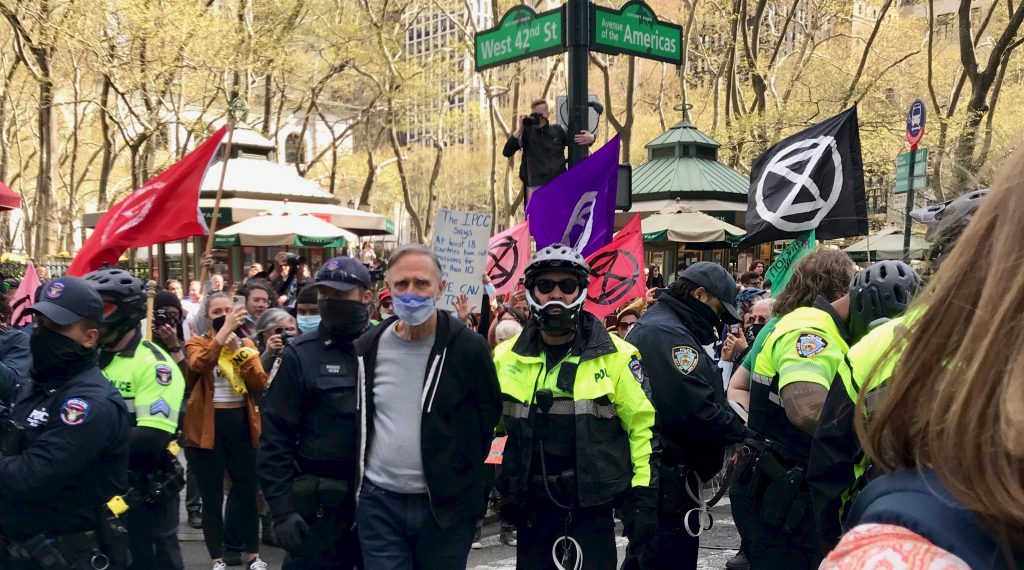Why Can’t We Move Faster on Climate?
What is it that has stopped the United States from dealing successfully with the climate crisis? We’ve known for at least 3 decades that we needed to act, but instead we’ve allowed the problem to get much worse. Is it the climate deniers? Is it people not taking lowering their “personal carbon footprints” seriously enough? Is it politicians who just don’t get it?
No! It is none of the above. The big barrier has been the fossil fuel companies–and the way they exert political power and manipulate public opinion. Climate denial was created by a deceitful disinformation campaign funded by ExxonMobil and others. The whole idea of a “personal carbon footprint” was a ploy invented by the PR department of BP Oil to distract the public from the huge responsibility borne by the fossil fuel industry. The politicians have been paid not to “get it.” Senator Joe Manchin, who recently sank the Build Back Better bill, has his own financial stake in the coal industry, and he also has taken in more the $400,000 in donations from oil and gas companies just in the last few months. He’s also the top lifetime recipient of oil, gas, and coal money among all those in Congress.
These companies have pursued their own profit and greed with abandon, while knowing that their very business itself was creating a climate crisis that threatens the existence of civilization as we know it. They have expanded their extraction and marketing dramatically, while climate scientists have been making it clear that fossil fuels must be eliminated entirely. They have used money, lies, and high-paid public relations experts to undermine every effort to address the climate crisis.
New historical information
A new report, just out, makes it clear that they were also responsible years ago for preventing the nations of the world from adopting mandatory, enforceable limits on greenhouse gas emissions that could have turned the crisis around by now. The Global Climate Coalition (GCC), was formed by the coal, oil, gas, electric utility, automotive, and rail sectors in 1989. Their “original and lasting intention” as reported in The Intercept, was to “push for voluntary efforts only and torpedo international momentum toward setting mandatory limits on greenhouse gas emissions.” They dishonestly cast doubt on the science and sought to keep international agreements “toothless.”
When nations did work together
In 1987 the nations of the world came together to address a different problem–the hole in the ozone layer , the layer of the atmosphere that protects humans from harmful levels of ultraviolet radiation from the sun. It was being depleted by the use of many human-made chemicals. All 198 member states of the UN adopted the Montreal Protocol, agreeing to a mandatory phasing out of the chemicals that caused ozone depletion. It was a powerful and remarkably unified step that was highly effective.
It scared the fossil fuel executives who thought they might be next for mandatory limits. The went into high gear–forming the GCC, proposing a voluntary-only regimen to the UN climate bodies, getting their politicians to pass a bill to undermine international climate agreements, and launching a $13 million PR campaign to prevent the U.S. from adopting the Kyoto Protocol. The Protocol mandated reductions n greenhouse gas emissions. The Clinton Administration had indicated support for its approach, but the GCC efforts undermined it and U.S. never signed it.
We came close
Amy Westervelt writes in The Intercept that newly available documents make it “painfully obvious … just how close the international process came to forcing action on climate in the 1990’s … [when] momentum was building for a binding international treaty that would mandate emissions reductions.” An agreement then would have had much greater impact than anything we can do now, but it was stymied by the GCC and the fossil fuel industry in general.
Distortion of the latest IPCC report by fossil fuel interests
The latest IPCC report, throughout its 3,000 pages is full of information about the role of the fossil fuel industry as a “vested interest” working actively against effective climate policy. As the Guardian put it, “The report made one thing abundantly clear, the technologies and policies necessary to adequately address climate change exist, and the only real obstacles are politics and the fossil fuel interests.”
The content of the report itself is controlled entirely by the scientists. The Summary for Policymakers, however, which is the part most often read by the press and the public, requires approval from governmental representatives from 195 countries, including multiple petrostates and business representatives. All mention of the obstructionist role being played by the fossil fuel industry was edited out of the Summary by industry lobbyists and the petrostates. Once again they are preventing the public from understanding the actual situation.
Successes and strategies — taking on the fossil fuel industry
It’s not easy taking on big fossil fuel companies, but the climate movement is having some successes. The divestment movement has gotten institutional commitments to divest some $39 trillion from fossil fuel companies. “Stop the Money Pipeline” is building pressure on banks to stop financing fossil fuel project. Some European banks have dramatically reduced their financing for the industry. There is an international effort to eliminate subsidies for fossil fuels. Thousands of local campaigns are challenging fossil fuel infrastructure projects. All of these have been the result of pressure by climate organizations and the people who participate in them.
Last May, all in one day, three oil companies suffered significant defeats. Sixty-one percent of shareholders at Chevron Oil voted, in the face of management objections, to require the company to cut the emissions caused by customers burning its products. At ExxonMobil shareholders elected three climate candidates to the company’s board, again over the objection of management. In the Netherlands a court ordered Shell, another giant oil company, to cut emissions from its products by 45% by 2030. I encourage you to join an activist organization that is taking on the fossil fuel industry in some way. This is an uphill battle, but it is winnable and essential.
*************
Just to share a small personal note: During the Earth Day weekend I traveled to New York City and joined in a non-violent civil disobedience action with Extinction Rebellion. We stopped traffic by sitting down in the middle of a busy Manhattan intersection in order to draw public attention to the urgency of addressing the climate crisis. I was tremendously impressed by the planning, skill, commitment, and care that XR brought to every aspect of this action, and was proud to be part of it with them. The photo below shows the police leading me away in handcuffs.

_________________
The photo at the top of the page is of a recent spring day in the New England woods – by Russ Vernon-Jones.
I’ll let you know when my next new post is available.
Click “Subscribe” below.

So glad to see oil politics, basic to our times, covered in your blog. I didn’t know about the editing of
the IPCC Summary. Ow. Would the IPPC have approved this? (Source?)
Thanks, also, for getting arrested. Marty Nathan would be so proud of you. 🙂
Barbara
This is concise and powerful information, Russ. Thank you.
Hi Russ,
Thank you for a very informative blog about the fossil fuel companies obstructionist role in addressing climate change.
What a great picture of you!
Hugs
Ken
Yes, thank you for narrowing the wide need to the top priority! And for walking your talk and getting arrested. I will share this blog widely. With gratitude, Dorothy
Russ: I am not surprised that you have devoted your life to being a climate-change activist. I have been actively involved in the cause for protection of the environment in both Hawaii and Northern California, where I have lived for the past 40 years (Mill Valley). I will now follow your blog eagerly. Love your civil disobedience. Thoreau would be proud.
Alan Goldberg
(Central High School, Philadelphia 223) and Beyond
Alan,
What a treat to hear from you – a high school classmate from many years ago! Here’s to being in the movement to preserve the earth together!
Russ